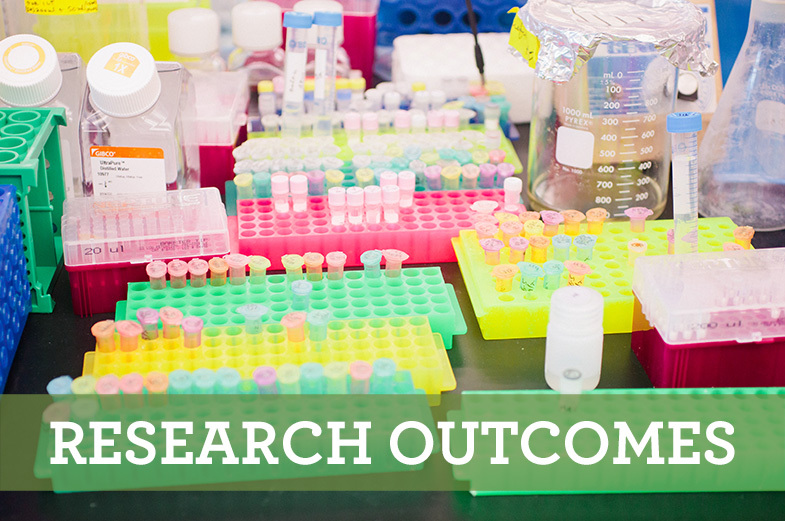This research is powered by you. This quarterly edition of the St. Baldrick’s Foundation Research Outcomes recognizes promising research to improve survival rates, provide holistic therapies, and translate adult drugs into pediatric trials.
Thank you for making research possible.

Reducing the Deaths from Infection after Bone Marrow Transplant
A bone marrow transplant can cure difficult to treat pediatric leukemia but has many short-term and long-term side effects. One major risk after transplant is viral infections, which can be hard to treat with available medicine, and can be deadly. St. Baldrick’s Fellow Dr. Jeremy Rubinstein and colleagues have had great success in tackling these viral infections by taking T-cells (a type of infection fighting cell that is part of the immune system) donated by children’s personalized stem cell donors and engineering them to attack and kill certain viruses.
Recently published results from their clinical trial offering this therapy as a preventative measure suggest that this treatment has been very safe and effective. Next steps include a randomized trial comparing this approach to the standard of care to see which is best at preventing and limiting the complications of viral infections. This clinical trial has the potential to decrease the number of pediatric cancer survivors who die from infection while also shortening hospitalizations and decreasing the need for other anti-viral medications.
This research was generously supported by the Rally for Ryan Fund, a St. Baldrick’s Hero Fund.
Translating Adult Drugs to Treat Incurable Brain Tumors
St. Baldrick’s Fellow Dr. Nathan Dahl uses genetic screening to identify new therapeutic targets in diffuse midline gliomas (DMGs), childhood brain tumors that are currently incurable. He found that CDK9 inhibitors, a class of drugs already moving forward in adult clinical trials, are a potential new treatment.
With St. Baldrick’s support, Dr. Dahl found that these inhibitors effectively treated models of DMG with minimal toxic side effects. This identified a new class of effective drugs ready for rapid translation into pediatric trials for this devastating disease. This discovery has now formed the basis for a phase 1 clinical trial, providing hope for future patients.
This research was supported by the Kids Shouldn’t Have Cancer Foundation, a St. Baldrick’s non-profit partner.
A Holistic Approach to Childhood Cancer
With St. Baldrick’s support, Dr. Ashraf Mohamed was able to bring Integrative Oncology to Cook Children’s Medical Center in Ft. Worth, Texas. Integrative Oncology brings specialists together and provides complimentary therapies for pediatric cancer patients. These evidence-based practices include interventions like animal-assisted therapy, rehabilitative services, psycho-education, psychosocial screenings, behavioral health strategies, creative art therapies, chaplain services, safe herbs/supplements program, and pain management strategies.
Information collected from psychosocial screenings will show staff trends in psychosocial distress which will aid in patient diagnosis and treatment decisions, and recommendations for the appropriate complementary therapeutic interventions. Next steps include expanding the psychosocial screenings to caregiver screenings which will meet all the same goals as the patient and aid in a family centered intervention. With the use of a caregiver distress screening, it will ensure that psychosocial risk is adequately assessed, evaluated, and strategic steps are taken to mitigate psychosocial harm to the family.
More Pediatric FDA Approvals as a Result of Clinical Trial Data
When St. Baldrick’s makes a grant to the Children’s Oncology Group (COG) these funds help to open and maintain lifesaving clinical trials. In 2021, the FDA used COG clinical trial data to authorize pediatric labeling indications for four chemotherapeutics, more than any prior year. These pediatric labeling indications demonstrate the high data quality and reliability that COG can achieve. More importantly, these studies were pivotal to approvals which allow broad access to effective medications for children with cancer.
Not every publication or outcome of research supported by St. Baldrick’s makes the news, but each one adds to the body of scientific knowledge that takes us one step closer to better outcomes for kids with cancer. Your continued support will make more research possible to Conquer Kids’ Cancer.
Donate now and help support research into better treatments for kids with cancer
Read more on the St. Baldrick’s blog:

 SBF
Tweets »
SBF
Tweets »